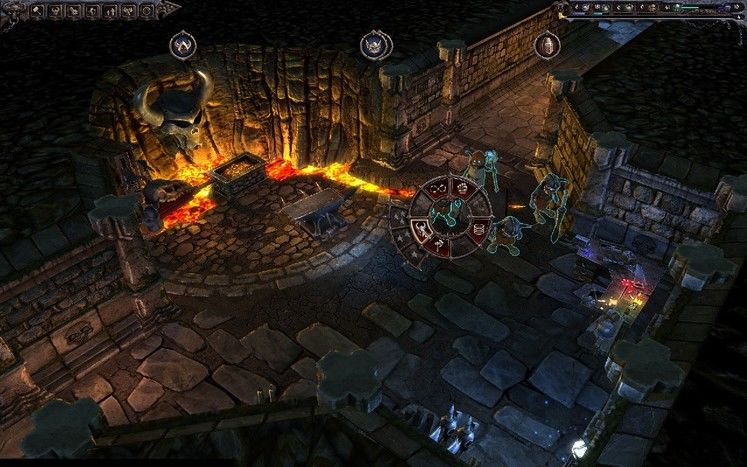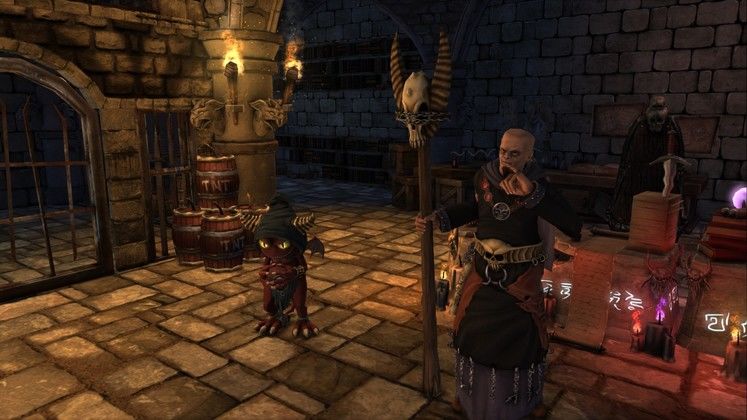But on closer inspection, something is off. The menacing demon standing before you is some guy wearing plastic horns. The treasure is painted on to the wall, and the deadly traps appear to be made with macaroni and craft glue, with a sprinkling of glitter. If the markings are to be believed, then they were made by Kevin, age six.
 |
| Impire features tactical cover based Dwarf combat, with upgradeable tactical beards. |
Impire starts with a Faustian deal between a semi-competent dolt and a demon from the circle of Hell known as ‘New Jersey’. The game’s tongue in cheek tone treats all the villainous acts as a big joke. Much like Dungeon Keeper did, but without the charm. The biggest joke, however, is on anyone who thought summoning a demon was without cost. This cost becomes horrifyingly clear when using the in-game interface.
‘Circle of Hell’ is a concise way of describing Impire’s UI. Ordering minions to do anything beyond movement requires lots of button holding, then waiting a second for a radial menu to turn up, then selecting the command you’d like, assuming that doesn’t bring up another menu.
I would honestly not be surprised if this interface design was whispered in the developer’s ear by evil spirits that feed on tedium. It’s a contender for the least intuitive control scheme for the mouse. It’s clunky, slow, and irritating. It would work suspiciously well for a touch screen though, so perhaps it will all make sense when Impire is released for the iPad.
Luckily, the building of dungeons is more concise: Too concise, in fact. Rooms aren’t designed, they’re slotted together. Each dungeon is a series of pre-fabricated rooms, dropped in. Even the entrances and exits are pre-determined, and new ones can’t be made. Because there’s such little control to be had over the layout it’s certainly possible to ruin your entire dungeon by putting a hallway or room in the wrong place, and once something is down, it’s down. There’s no cancelling or rebuilding to be had.
The creatures on the other hand, will do just what you will tell them, mostly. Minions are sorted into squads, as it’s functionally impossible to guide them individually, unless you’re a masochist. Impire is built to be played with these squads and there is some reward to the system, as mixing and matching different creatures will yield different abilities as the squad levels up both individually and as a group.
This is the biggest source of depth in the game, and putting it into practice on the battlefield the biggest source of enjoyment as it offers the chance to personalise how groups of creatures operate. It’s a concept that actively promotes experimentation with, and attachment to your minions.
Which makes it all the more confusing why none of this is explained to the player in game, and is something they have to discover for themselves. This highlights one of Impire’s core problems. Its sole innovation is its most underexposed facet. It gives the title some character, while so many other things are distant, bland, and indistinct.
 |
| Impire’s interface looks pretty sleek, right? Just wait ‘til you get to use it… |
Impire might be one of the biggest proponents of the worth of good sound design, because it may as well not have any, and its absence is noticeable. There’s little to no ambient sounds in the dungeons, unless the view is zoomed as close as it will go, which leaves the game feeling far more lifeless than it should. Unless zoomed in, the creatures only make noise when fighting, adding to the impression that they’re mindless automatons rather than an army of monsters.
There is a weak nod toward this in the form of the aggression meter, which decides how effective creatures are, based on their hunger. It’s not completely without merit in the sense that it meshes with certain abilities and upgrades, but it’s micromanagement for the sake of micromanagement, and it is, by definition, a chore.
So Impire isn’t Dungeon Keeper. Impire isn’t even a dungeon management game. It’s an RTS game in a Dungeon Keeper costume. The thing is, despite its flaws, I was growing to like it. It’s not the deft blend of genres its inspiration is, nor is it as seamlessly excellent and inspired; it’d certainly take some skill at the craft to make an inspired copy of something that’s already been done to near perfection.
What it is, is a stripped down, more straightforward version of what Dungeon Keeper did, in a vague, synoptic way. Once abilities, traps, and creatures start unlocking and you’ve acclimatised to the controls, it’s quite fun, and reasonably addictive, if draining. The Circle of Hell™ takes its toll.
You’ll notice I said “was”. I “was” growing to appreciate Impire. Dungeons are dark and damp, the ideal environment for bugs. Impire released with all manner of outrageous, game breaking glitches, the most prevalent being ones that caused crashing.
The first patch fixed some of this, but I’ve been enjoying a fresh bug the patch created, where certain attempts to save the game will crash the program and corrupt the save file, meaning the level will have to be restarted. Impire’s stages tend to be quite involved with many twists and turns, and honestly, this is the one bug (of many) that’s actively souring the experience.
The rooms are nondescript analogues of Dungeon Keeper’s, but with less functionality. Spells are anticlimactic with little event or impact. The dialogue is mostly annoying ("Faster than a shark, that’s me!" What?), and dungeon construction is both impersonal and counter-productive in how arbitrary it is when deciding where acceptable places for rooms and hallways.
 |
| See, it’s funny because Dr. Evil does that finger thing, and this guy is evil too. |
Impire does have an interesting approach to resources, with its above world raids (it’s a 2D map) and points system of dungeon upgrades based on performance but, ultimately, Impire is flawed, conceptually and technically.
If you give it a chance beyond the first two levels, enjoy the part of strategy games where you raise armies, and the levelling up aspect of RPGS, you’re likely to enjoy Impire, provided you can look past its shallow attitude to the construction side of dungeon ‘design’. Impire often manages to be good, but it does so despite itself.
IMPIRE VERDICT
If you give it a chance beyond the first two levels, enjoy the part of strategy games where you raise armies, and the levelling up aspect of RPGS, you’re likely to enjoy Impire, provided you can look past its shallow attitude to the construction side of dungeon ‘design’. Impire often manages to be good, but it does so despite itself.
TOP GAME MOMENT
Levelling up Baal from a boulder headed cartoon to an imposing demon lord.




